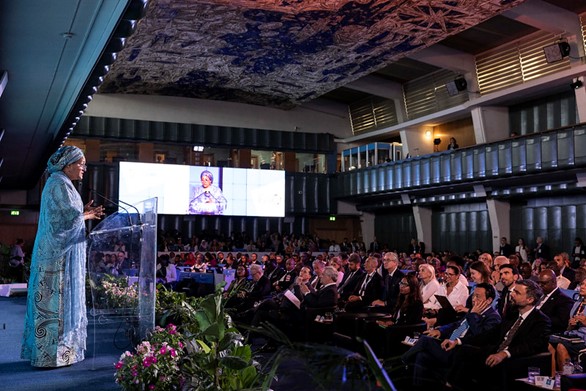SEED FUNDING JOINT PROGRAMMES
Egypt
Strengthening Sustainable and Resilient Food and Nutrition Systems in Egypt for SDG Acceleration




PROJECT TITLE | Strengthening Sustainable and Resilient Food and Nutrition Systems in Egypt for SDG Acceleration |
| Context | Egypt engaged actively in the 2021 Food Systems Summit process, convening a national dialogue and developing national pathways with recommended interventions for improving food security and nutrition by 2030. To enhance multi-sectorial coordination and spearhead the transformation process, the Government created a National Committee for Food and Nutrition Systems chaired by the Prime Minister and bringing together several ministries to coordinate joint actions. Strengthening coordination mechanisms, fostering multi-stakeholder partnerships, consolidating accountability structures, focusing on the availability of evidence, analysis, and data, are identified as key priorities to strengthen the food systems governance structure in Egypt. |
| PUNOs | WFP, FAO, UNICEF |
| Contribution to SDGs | SDG 2 Zero Hunger, SDG 3 Good Health and Well-being, 12 Responsible Consumption and Production. |
| Contribution to other SDG transitions | Climate, biodiversity, pollution |
| Duration | June 2024 – May 2025 |
| Expected financial leverage | $87,000 (PUNO co-financing) |
| Alignment with SG Call to Action | Policy integration; Food systems governance; Research, data, technology and innovation; Inclusive and participatory design; Private sector engagement |
| Outcomes | The JP contributes to strengthening policy and governance frameworks for food systems transformation and generating evidence and analysis on key dimensions of food systems to inform decision-making, supporting the work of the National Committee for Food and Nutrition Systems. The JP complements the government’s flagship program “Country Platform for the Nexus of Water, Food and Energy”, which provides a mechanism to mobilize climate finance and private investments. |
| Partners |
|
| Outputs |
|
PRESS RELEASE: Global Leaders and Stakeholders Rally for Accelerated Food Systems Transformation at UN Food Systems Summit +2 Stocktaking Moment

Pictured: UN Deputy Secretary-General, Amina J. Mohammed introducing the UN Secretary General’s Call to Action for accelerated Food Systems Transformation at the UN Food Systems Summit +2 Stocktaking Moment Closing Ceremony.
©FAO
Rome, 26 July 2023 –The UN Food Systems Summit +2 Stocktaking Moment (UNFSS+2) concluded today after three days of intensive discussions and collaborations aimed at making food systems work better for people and the planet while advancing the implementation of the 2030 Agenda. The summit, convened by the UN Secretary General and hosted by the government of Italy, in collaboration with the Rome-based UN Agencies (Food and Agriculture Organization of the United Nations , International Fund for Agricultural Development, World Food Programme), the UN Food Systems Coordination Hub, and the wider UN system, saw over 3300 participants, including delegations from 182 countries, 21 world leaders and 126 ministers, 225 Non-state Actor organisations and close to 900 UN system representatives, gather to share efforts and steer global action towards sustainable food systems.
In her remarks at the closing ceremony, UN Deputy Secretary General, Amina J. Mohammed, acknowledged the urgent need to address the challenges faced by food systems, stating, "We are failing in our quest to end poverty and hunger; in our fight against climate change, pollution and biodiversity loss; and in our pursuit of gender equality, shared prosperity and peace for all. Yet, I am heartened by what I have seen over the last three days. In two years, the vision that the Secretary-General put forward in the 2021 Food Systems Summit has rooted, creating momentum for a movement."
The summit provided a platform for countries to share their food systems journeys through more than 100 voluntary reports, offering vivid accounts of achievements and pointing to the challenges. The global community highlighted the importance of accelerating progress, in particular on access to financing, emphasizing the urgent need for debt relief and increased liquidity for developing countries facing crises.
The UNFSS+2 culminated in the launch of the Secretary-General's Call to Action for accelerated Food Systems Transformation. The Call to Action focuses on six concrete objectives: embedding food systems strategies in national policies; establishing food systems governance with a whole-of-society approach; investing in research, data, innovation, and technology capacities; promoting business engagement and accountability for sustainability; including full participation of marginalized groups including women; farmers, youth and Indigenous Peoples; and ensuring long-term, concessional finance for food systems transformation.
"We leave this stocktaking with a clear path forward, and a renewed sense of urgency and conviction. At every step, the UN System, led by the coordinated action of the Rome-based agencies FAO, WFP and IFAD, and the UN Food Systems Coordination Hub, will continue to provide leadership to make food systems transformation a reality for 155 countries and stakeholders that have embarked on this process already, and those that we encourage to join in the future", DSG Mohammed continued.
The Call to Action outlines the priorities for the UN Food Systems Coordination Hub for the coming years, which include a focus on increasing the capacity of National Food Systems Convenors to shepherd inclusive national processes as well as coordinating UN entities, leveraging international Coalitions of Action and aligning with other actors to optimise support for national and global action. The Hub will continue its pursuit of evidence-based and multistakeholder food systems transformation processes, through the promotion of independent scientific advice. It is additionally tasked to draw on the newly created Window for Food Systems Transformation under the UN Joint SDG Fund - for which $100 million needs to be secured by the end of 2024 - to enable fast-tracked transformation processes, working with the Resident Coordinators, the UN Country teams and the broader ecosystem of support.
The UN Food Systems Summit +2 Stocktaking Moment has set the stage for concrete and accelerated efforts to turn the tide, empowering stakeholders and food systems actors to work in synergy and in solidarity to make food systems work for the benefit of people, planet and prosperity.
Read the UN Secretary General’s Call to Action for accelerated Food Systems Transformation here.
